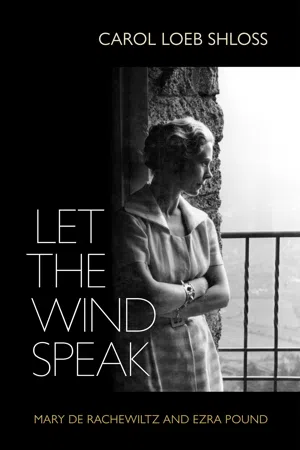
- 1 pages
- English
- ePUB (mobile friendly)
- Available on iOS & Android
About This Book
Carol Loeb Shloss creates a compelling portrait of a complex relationship of a daughter and her literary-giant father: Ezra Pound and Mary de Rachewiltz, Pound's child by his long-time mistress, the violinist Olga Rudge. Brought into the world in secret and hidden in the Italian Alps at birth, Mary was raised by German peasant farmers, had Italian identity papers, a German-speaking upbringing, Austrian loyalties common to the area and, perforce, a fascist education.For years, de Rachewiltz had no idea that Pound and Rudge, the benefactors who would sporadically appear, were her father and mother. Gradually the truth of her parentage was revealed, and with it the knowledge that Dorothy Shakespear, and not Olga, was Pound's actual wife. Dorothy, in turn, kept her own secrets: while Pound signed the birth certificate of her son, Omar, and claimed legal paternity, he was not the boy's biological father. Two lies, established at the birth of these children, created a dynamic antagonism that lasted for generations.Pound maneuvered through it until he was arrested for treason after World War II and shipped back from Italy to the United States, where he was institutionalized rather than imprisoned. As an adult, de Rachewiltz took on the task of claiming a contested heritage and securing her father's literary legacy in the face of a legal system that failed to recognize her legitimacy. Born on different continents, separated by nationality, related by natural birth, and torn apart by conflict between Italy and America, Mary and Ezra Pound found a way to live out their deep and abiding love for one another. Let the Wind Speak is both a history of modern writers who were forced to negotiate allegiances to one another and to their adopted countries in a time of mortal conflict, and the story of Mary de Rachewiltz's navigation through issues of personal identity amid the shifting politics of western nations in peace and war. It is a masterful biography that asks us to consider cultures of secrecy, frayed allegiances, and the boundaries that define nations, families, and politics.
Frequently asked questions
Information
Table of contents
- Cover
- Title Page
- Copyright
- Epigraphs
- Contents
- Preface
- Chapter 1. Deep Cover: Hiding Children in the Tyrol, 1925–37
- Chapter 2. The Enigma of Identity: Italy, 1937–43
- Chapter 3. Transmission, Interception: Italy, 1944–46
- Chapter 4. Secret Agents: The OSS and FBI in Rome and London, 1944–46
- Chapter 5. Waiting for Signals: The Tyrol, 1946–58
- Chapter 6. Betrayal: Brunnenburg, 1958–62
- Photographs
- Chapter 7. The Yale Network and the Archive, 1958–76
- Chapter 8. Leonard Doob and Africa, 1965–72
- Chapter 9. Transparency: Publishing the Rome Radio Speeches, 1973–76
- Chapter 10. Safe House: Brunnenburg, 1976–84
- Chapter 11. The Right Frequency, 1985–2002
- Epilogue, 2015
- Notes
- Bibliography
- Index
- Acknowledgments